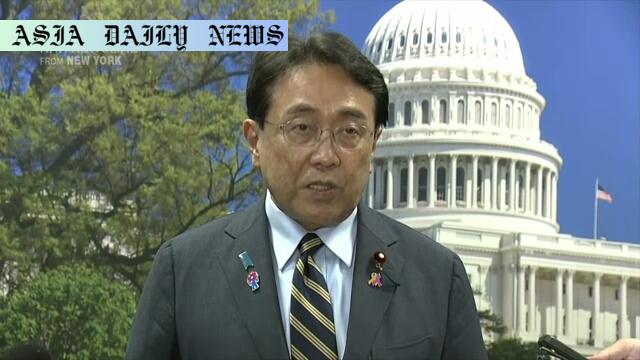Tariff Negotiations: Akazawa seeks deal ahead of Aug 1 deadline amid concerns over Japan’s ruling coalition’s election setbacks.

High-Stakes Trade Negotiations Take Center Stage
The ongoing tariff negotiations between Japan and the United States have entered a critical phase. Leading the discussions is Japan’s Economic Revitalization Minister Akazawa Ryosei, who recently arrived in Washington for the eighth time to engage in high-priority talks. These discussions come against a backdrop of political shifts in Japan, where the country’s ruling coalition experienced a decline in support during the Upper House elections over the weekend. Despite the political turbulence, Minister Akazawa remains adamant that these negotiations will continue unaffected, describing them as actions centered around ‘national interests.’
Imminent Tariff Deadline Sparks Urgency
The August 1 deadline imposed by U.S. President Donald Trump for introducing a 25 percent tariff on Japanese imports has intensified the urgency for both sides. Japan, aiming to avoid the economic repercussions of such measures, seeks to find common ground without compromising its national economy. ‘We will continue vigorous discussions to find a mutually agreeable solution between Japan and the United States, while firmly protecting our interests,’ emphasized Akazawa during his statement to reporters upon arrival in Washington.
U.S. Prioritizes Quality Over Speed
In contrast, U.S. officials, including Treasury Secretary Scott Bessent, have expressed a preference for prioritizing the caliber of the trade agreement rather than adhering to the rigid deadline. During a recent interview with CNBC, Bessent remarked that Washington’s primary focus is on securing ‘high-quality deals’ that are in the best interests of the American public, irrespective of the timeline set by the White House.
Complexity of Ongoing Trade Relations
The complexity of these trade discussions is further underscored by Akazawa’s intent to meet with key U.S. officials, including Commerce Secretary Howard Lutnick and Trade Representative Jamieson Greer. Yet, whether these sessions will generate tangible progress or underscore the areas where both nations diverge remains uncertain at this stage. The broader implications of an unresolved trade agreement could significantly impact bilateral relations, economic stability, and international trade policies.
Election Outcomes and National Interests
The recent election outcomes in Japan have seemingly added another dimension to the negotiation narrative, yet Akazawa insists that these results bear no influence on the ongoing dialogue. This statement reflects a determined approach to safeguard Japan’s economic interests, irrespective of domestic political developments. Despite this, some observers speculate that the political shift could subtly influence the tenor of the negotiations, particularly in how Japan positions itself on key discussion points.
What Lies Ahead for Japan-U.S. Trade Relations?
As the August 1 deadline approaches, the stakes continue to rise. Economic analysts are keenly observing whether Japan and the U.S. can bridge their differences. Achieving a comprehensive deal that satisfies both nations’ interests will require strategic compromise, diplomatic finesse, and a commitment to multilateral agreements. Failure to reach an agreement could set the stage for further economic uncertainties, heralding a new phase of trade tensions between the two allies.
Commentary
Examining the Stakes of Japan-U.S. Trade Talks
It is often said that trade negotiations symbolize the delicate balance between national interests and global cooperation. This sentiment is especially evident in the current Japan-U.S. tariff discussions. As Akazawa Ryosei travels to Washington for the eighth time, one is reminded of the complexities that underpin international trade relations. This protracted effort underscores how high the stakes are for both nations. Japan, for instance, faces the daunting prospect of grappling with a 25 percent tariff that could undermine its economic growth trajectory. For the U.S., the focus remains steadfastly on securing advantageous trade terms that align with domestic economic policies.
The Impact of Political Backdrop on Trade
It is intriguing to consider how Japan’s recent election results might indirectly shape its stance in these negotiations. While Minister Akazawa has categorically dismissed the relevance of the election outcome, one cannot ignore its potential influence. Domestic political shifts often have a cascading effect on international policies, especially in democratically governed nations. The ruling coalition’s weakened position could embolden opposition voices that may criticize concessions offered during trade talks. Simultaneously, it adds pressure on the government to demonstrate strength and resolve on the global stage.
Broader Implications of Trade Agreements
Looking beyond the immediate implications, these negotiations serve as a microcosm of the broader challenges inherent in international trade. Securing ‘high-quality’ deals, as emphasized by U.S. Treasury Secretary Scott Bessent, requires not only strategic foresight but also a willingness to navigate political realities. This task grows exponentially more challenging in an era where protectionist policies are gaining traction globally. The outcome of these talks could set an important precedent, influencing how other nations approach trade relations amidst geopolitical uncertainties.


